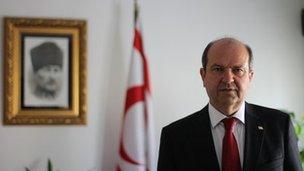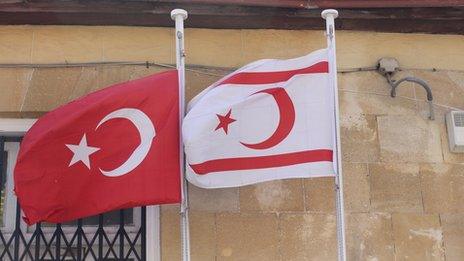Crisis offers opportunity to heal Cyprus division
- Published
Chris Morris asks if the Cyprus crisis could be an opportunity to heal the division between the island's Greek Cypriots and Turkish Cypriots
"I was born in 1951 in this walled city," says Semari Asik, "and I've lived here all my life."
We are driving through northern Nicosia in a classic open-topped car, just a few metres from the Green Line, which separates the internationally recognised Republic of Cyprus from the self-styled Turkish Republic of Northern Cyprus (TRNC), which is only recognised by Turkey.
Residents of northern Cyprus have had to deal with international isolation for decades, but they are now monitoring the financial and banking crisis in the Republic of Cyprus extremely closely.
Mr Asik, a classic car enthusiast, says he feels the pain of his neighbours on the other side of the Green Line.
"I have sympathy for them. I feel it because we have been going through economic crises many times in the north," he says.
But like many other Turkish Cypriots, Mr Asik now wonders whether the crisis in the Republic of Cyprus could - in time - produce an opportunity to end the division of the island.
"The Greek Cypriots may want a solution more than they used to," he argues, as we navigate through the narrow lanes.
"If both sides suffer the same crisis, then they can sit around a table and solve this problem more easily."
'Realistic'
The stalemate in Cyprus has been frozen in place since 1974, when a Greece-backed coup prompted a Turkish military intervention in the north of the island.
Many people were displaced from their homes during the bloodshed.
The TRNC now has a growing tourism sector, and it attracts thousands of foreign students to its higher education system. But it remains totally dependent on financial support from the Turkish mainland to survive.
So the prospect of banks in northern Cyprus gaining business, while the financial system in the Republic of Cyprus is in disarray, is a tempting one.

Ersin Tatar says the Republic of Cyprus should have been more realistic about its banking system
At the office of Ersin Tatar, the finance minister of the breakaway Turkish Cypriot state, they talk up a banking system that has certainly had its problems in the past but looks like a safer bet at the moment.
"Anyone who wants to open a bank account can come here, as long as they abide by international rules and regulations," Mr Tatar says.
He is particularly keen to attract some of the tens of thousands of British citizens who have money in banks in the Republic of Cyprus.
"We don't want any dirty money," he asserts, "but we have a good banking system supported by Turkey, and we have a good life."
Like almost every Turkish Cypriot you meet, he insists that he has many Greek Cypriot friends. But he cannot resist a dig at the authorities on the other side of the divide.
"They should be more realistic," he says. "Overconfidence and being unfair to others eventually comes back to knock on your door."
Seeking recognition
On the island's northern coast, the wind is whipping up the waves just outside the harbour walls in Kyrenia, known to the Turks as Girne.
Pleasure boats are rocking gently on their moorings as tourists eat at the cafes and locals soak up the spring sunshine.
"If we had any money we would lend it to [the Greek Cypriots]," says Sabri Abit with a wry smile.
"Of course, you know no-one lends us any money, because we don't exist."
It is a reminder that, despite their current difficulties, Greek Cypriots still have one thing the Turkish Cypriots do not - international recognition.
"If there could be a solution in this country," argues Mr Abit's friend, Musa Aksoy, "we could all live in peace and in wealth."
Just before Cyprus joined the European Union in 2004, the United Nations devised a plan to reunite the island, forming a new federation of two states.

The TRNC is dependent on financial support from the Turkish mainland
Turkish Cypriots approved the Annan Plan, but it was rejected by a large majority of Greek Cypriots.
"As long as we're divided," Mr Aksoy says ruefully, "we will continue to have economic trouble."
Equalising factor
Now, though, the view from many in northern Cyprus is that the crisis in the Republic of Cyprus could be an equalising factor.
They point out that the new Cypriot President, Nicos Anastasiades, was one of the few Greek Cypriot politicians to campaign in favour of the Annan Plan.
And if a majority on both sides think reconciliation would make them all better off then maybe - just maybe - one of Europe's last dividing lines would finally disappear.
There have been plenty of false dawns in Cyprus before, and there will be furious resistance to change.
Mr Anastasiades, in particular, will have limited room for manoeuvre, given the political pressures of the bailout agreement.
But these are strange times and, in one way or another, Cyprus is entering a new era.